| |
|
|
Introduction
( Says Tuka ) -
Dilip
Chitre |
|
|
|
Dilip
Purushottam Chitre (born 1938) is one of the foremost Indian writers and
critics to emerge in the post Independence era. Apart
from being a very important |
|
important bilingual writer,
writing in Marathi and English, he is also a painter and
filmmaker.
Among Chitre’s honours and awards are the Prix
Special du Jury for his film 'Godam' at the Festival des Trois
Continents at Nantes in France in 1984, the Sahitya Akademi
Award (1994) for his Marathi book of poems 'Ekoon Kavita-1' and
the Sahitya Akademi Translation Prize (1994) for his English
translation of the poetry of the 17th century
Marathi poet-saint Tukaram 'Says Tuka'. He was
Member of the International Jury at the
|
|
|
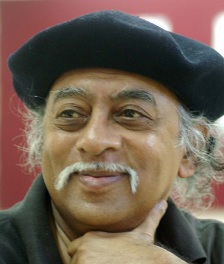 |
| recent Literature festival Berlin, 2001.He
is Honorary Editor of the quarterly ‘New Quest’. |
|
|
Introduction
Part I of
IV
(Says Tuka) |
|
Tukaram was born in 1609 and vanished without a trace in
1650.What little we know of his life is a reconstruction from his own
autobiographical poems, the contemporary poetess Bahinabai's memoirs in verse,
and the latest biographer of Marathi poet-saints, Mahipati's account. The rest
is all folklore , though it cannot be dismissed on those grounds alone. Modern
scholars such as the late V.S.Bendre have made arduous efforts to collate
evidence from disparate contemporary sources to establish a well-researched
biography of Tukaram. But even this is largely conjectural. |
|
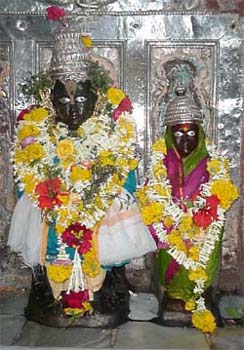 |
|
Vithoba-Rakhumai |
|
|
|
There is a similar mystery about Tukaram's manuscripts. The
Vithoba-Rakhumai temple in Tukaram's native village, Dehu, has a
manuscript on display that is claimed to be in Tukaram's own
handwriting. What is more important is the claim that this
manuscript is part of the collection Tukaram was forced to sink
in the local river Indrayani and which was miraculously restored
after he undertook a fast-unto-death. The present manuscript is
in a somewhat precarious condition and contains only about 250
poems. At the beginning of this century the same manuscript was
recorded as having about 700 poems and a copy of it is still
found in Pandharpur.
Obviously, the present manuscript has been
|
|
|
|
vandalized in recent times, presumably by
scholars who borrowed it from unsuspecting trustees
of the temple. It is important to stress that the claim that this manuscript is
in Tukaram's own handwriting is not seriously disputed. It is an heirloom handed
down to Tukaram's present descendants by their forefathers.
Tukaram had many contemporary followers. According to the Warkari pilgrims'
tradition , fourteen accompanists supported Tukaram whenever he sang in public.
Manuscripts attributed to some of these are among the chief sources from which
the present editions of Tukaram's collected poetry derive. some scholars believe
Tukaram's available work to be in the region of about 8000 poems. This is a
subject still open to research. The standard edition of the collected poetry of
Tukaram is still the one "printed and published under the patronage of the
Bombay Government by the proprietors of the Indu-Prakash Press" in 1873. This
was reprinted with a new critical introduction in 1950 on the occasion of the
tri-centennial of Tukaram's departure and has been reprinted at regular
intervals ever since by the Government of Maharashtra. This collection contains
4607 poems in a certain numbered sequence.
In sum the situation is :
i. We do not have a single complete manuscript of the collected poems of Tukaram
in the poet's own handwriting.
ii . We have some contemporary versions but they do not tally.
iii. We have many other versions on the oldest texts and occasionally, poems
that are not found elsewhere.
The various versions of Tukaram's collected poems are transcriptions made from
the oral tradition of the Varkaris and/or copies of the original collection or
contemporary "editions " thereof.
This is a tangled issue best left to the experts. The point to be noted is that
every existing edition of Tukaram's collected works is by and large a massive
jumbled collection of randomly scattered poems of which only a few are in
clearly linked sequences and thematic units. There is no chronological sequence
among them. Nor, for that matter, is there an attempt to seek thematic coherence
beyond the obvious and broad traditional divisions made by each anonymous
"editor" of the traditional texts.
One of the obvious reasons why Tukaram's life is shrouded in mystery and why his
work has not been preserved in its original form is because he was born a
Shudra, at the bottom of the caste hierarchy. In Tukaram's time in Maharashtra,
orthodox Brahmins held that members all varnas other than themselves were
Shudras. Shivaji established a Maratha kingdom for the first time only after
Tukaram's disappearance. It was only after Shivaji's rise that the two-tier
caste structure in Maharashtra was modified to accommodate the new class of
kings and warrior chieftains as well as the clans from which they came as proper
Kshatriyas.
For a Shudra like Tukaram to write poetry on religious themes in colloquial
Marathi was a double encroachment on Brahmin monopoly. Brahmins alone were
allowed to learn Sanskrit, the language of the gods" and to read religious
scriptures and discourses. Although since the thirteenth century poet-saint
Jnandev, there had been a dissident Varkari tradition of using their native
Marathi language for religious self-expression, this had always been in the
teeth of orthodox opposition. Tukaram's first offence was to write in Marathi.
His second, and infinitely worse offence, was that he was born in a caste that
had no right to high, Brahminical religion, or for that matter to any opinion on
that religion. Tukaram's writing of poetry on religious themes was seen by the
Brahmins as an act of heresy and of the defiance of the caste system itself. |
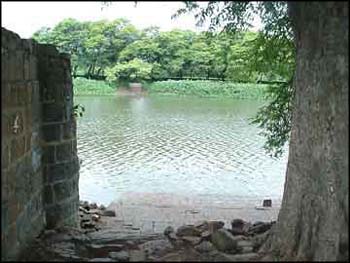 |
|
Indrayani river at Dehu |
|
|
In his own lifetime Tukaram had to brave the wrath of orthodox Brahmins. He was
eventually forced to throw all his manuscripts into the local Indrayani river at
Dehu, his native village, and was presumably told by his mocking detractors that
if indeed he were a true devotee of God, then God would restore his sunken
notebooks. Tukaram then undertook a fast-unto-death praying to God for the
restoration of his work |
|
|
of a lifetime. After thirteen days of fasting,. Tukaram's sunken
reappeared from the river. They were undamaged.
This ordeal-by-water and the miraculous restoration of his manuscripts is the
pivotal point in Tukaram's career as a poet and a saint. It seems that after
this episode his detractors were silenced , at least for some time. |
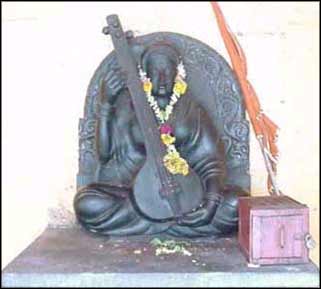 |
|
Bahinabai |
|
But Tukaram and his miraculously restored manuscript collection both disappeared
after this. Some modern writers speculate on the possibility that Tukaram could
have been murdered and his work sought to be destroyed. However, Tukaram was
phenomenally popular during his lifetime and was hailed as "Lord Pandurang
incarnate" by contemporary devotees like the poetess Bahinabai. Any attack on
his person, let alone a successful attempt on his life, would not have
escaped the keen and constant
attention of
|
|
his
numerous followers. Therefore, such speculations seem wild and sensational.
Shivaji was born nineteen years before the disappearance of Tukaram. The
|
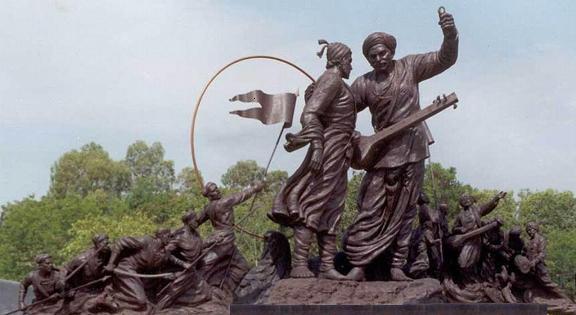 |
| |
Maratha kingdom was yet to be founded when
Tukaram departed from this world.
At this juncture, the whole Deccan region was in the
throes of a political upheaval. Trampled by rival armies and
ravaged by internecine war- |
|
|
Shivaji |
Tukaram |
|
|
fare, small farmers in the village of
Maharashtra faced harrowing times.
Around 1629, there was a terrible famine followed by waves of epidemic diseases.
Tukaram's first wife, Rakhma, was an asthmatic, and probably also a consumptive
woman. Though he had been married to his second wife Jija while Rakhma was still
alive, Tukaram loved Rakhma very dearly. Rakhma starved to death during the
famine while Tukaram watched in helpless horror.
Shivaji was born within a year of the terrible famine that ruined
Tukaram's family as it did thousands of others. Even after Shivaji's rise a few
years later, things could not have been better for the average farmer in the
villages of Maharashtra. Though Shivaji's brief reign was popular by all
accounts, he was battling the might of the Mughal military machine, waging a
constant guerilla war.
Relative peace and stability returned to
Maharashtra only about a century after Tukaram. While it had tenaciously
survived the political turmoil surrounding it, the Varkari religious movement
witnessed a revival only after the situation became more settled. Tukram's great
grandson, Gopalbuwa, played an important role in this revival. Otherwise, for
four generations the history of Tukaram tradition remained obscure even though
increasing numbers of people claimed to have become Tukaram's followers. |
|
|
|
Introduction
Part II of IV |
|
|
|
Contents |
|
|
|